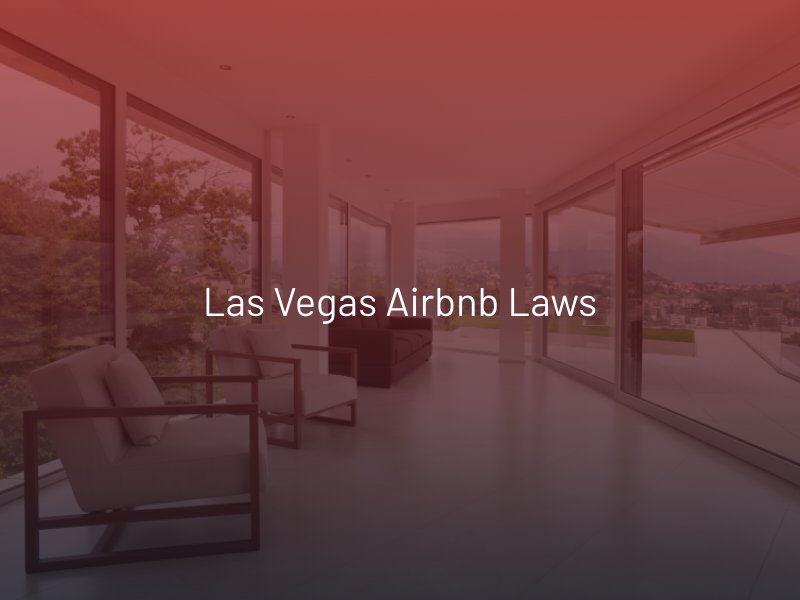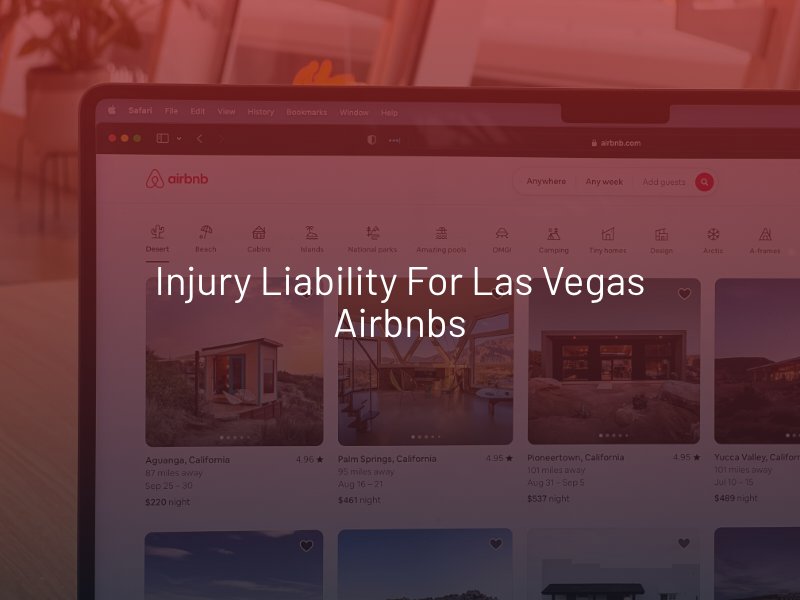Las Vegas Airbnb Laws
The unique hospitality services offered by Airbnb are very popular for both guests seeking temporary housing in Las Vegas and property owners wanting to make additional income. While most guests have a good experience, it can sometimes go wrong. If you suffer an injury, become ill, or your property is damaged while staying in someone else’s home, it is important to know the laws concerning the company’s and property owner’s liability.

Premises Liability
Most claims for injury accidents that take place on another person’s property in Las Vegas fall under premises liability law. Of course, a property owner cannot be responsible for all injuries that occur in their home. Still, if they either create or knowingly allow a dangerous situation to exist without resolving it, they can be liable in a premises liability lawsuit.
A Host’s Duties to Guests
Airbnb hosts have a high legal obligation to provide a rental property that is reasonably safe from preventable harm. The company suggests that hosts provide house rules and a guest manual that includes anything that guests should be aware of while visiting. For example, whether certain areas are off-limits or any known hazards.
All short-term rental hosts in Las Vegas are required to have their property inspected by the City as part of the Conditional Use Verification (CUV) Permit approval process. The inspector should confirm that any safety requirements are met, such as fire extinguishers, smoke detectors, carbon monoxide detectors, pool access barriers, and more. The complete list can be found here.
The city also requires hosts to provide proof of liability insurance coverage with a $500,000 minimum amount.
City of Las Vegas Airbnb Laws
Las Vegas permits short-term rentals (defined as leases of 30 days or less) in residential neighborhoods only when all of the following conditions are met:
- Owner Occupancy: The home must be the owner’s primary residence, and the owner must live on-site during the rental period.
- Bedroom Limit: Only properties with three or fewer bedrooms are eligible for short-term rental licensing.
- Separation Requirement: Each short-term rental must be located at least 660 feet away from another licensed short-term rental.
- Prohibited Areas: Rentals are not permitted in specific zones, including Summerlin and parts of the Las Vegas Medical District.
- Business License Required: All operators must obtain a City of Las Vegas business license before offering their property for short-term stays.
- Maximum Occupancy: Rentals must adhere to occupancy limits—two people per bedroom, with a maximum of ten total guests.
- Noise Regulations: Outside noise or excessive noise audible 50 feet from the property line violates Las Vegas Municipal Code. Guests must comply with all noise ordinances.
- Parking Rules: All vehicles associated with the short-term rental must be parked in the driveway. Parking must not obstruct neighbors’ driveways or community mailboxes.
- Trash Compliance: Trash and refuse must not be left outside or in public view unless properly contained for collection in accordance with Las Vegas Municipal Code Chapter 9.08.
- No Commercial Events: The city strictly prohibits all events, including weddings, birthday parties, bachelor/bachelorette parties, and other special gatherings at short-term rental properties.
The city maintains a 24/7 hotline at 702-229-3500 for reporting noise, parties, illegal rentals, or other violations.
Clark County (Unincorporated Areas) Airbnb Regulations
As of July 2023, Clark County began accepting applications for short-term rental licenses. Key rules include:
- Inspections: Properties must pass safety and fire code inspections.
- Separation Requirement: The County adopted a distance separation of 1,000 feet between licensed short-term rentals. Additionally units cannot be located within 2,500 feet of a resort hotel.
- Prohibited Locations: Short-term rentals are not allowed within the Town of Mt. Charleston, Moapa Township, Moapa Valley Township, Mesquite Township, or Bunkerville Township.
- Application Cap: The county is limiting the number of licenses issued initially to assess community impact. Additionally each person or entity approved can only have one licensed short-term rental unit in residential areas.
Unlicensed rentals are subject to fines of up to $10,000 per violation.
Enforcement and Penalties
Las Vegas and Clark County enforce Airbnb laws aggressively:
- Fines: Violators face significant civil penalties.
- Cease and Desist Orders: Unlicensed properties can be shut down immediately.
- Repeat Offenders: Multiple violations can result in permanent disqualification from operating a short-term rental.
Both jurisdictions use data from Airbnb, Vrbo, and other platforms to identify unlicensed listings.

Injury Liability For Las Vegas Airbnbs
If you or a loved one gets hurt, becomes ill, or has property damaged while staying at an Airbnb, you may have multiple options for coverage.
Airbnb AirCover
Airbnb previously only acted as a broker between hosts and willing guests and could rarely be held liable for guest injuries unless they allowed a dangerous host to still post their property, for example. As of November 2021, Airbnb rolled out AirCover, which provides hosts with $1 million in liability coverage for free. As long as you can prove your injury occurred due to the property owner’s negligence and the property owner is legally responsible, this host liability policy provides coverage for:
- Bodily injury to you (or others)
- Damage to or theft of your property (or others property)
- Damage caused by you (or others) to common areas, like building lobbies and nearby properties
This insurance policy will not cover:
- Damage or injury resulting from something done intentionally
- Damage to the house or host’s belongings caused by you (which is covered by Host damage protection)
- Other exclusions apply
Homeowner’s Insurance
If for some reason, your injury accident is not covered under Airbnb’s host liability insurance, you may be able to file a claim against the property owner’s homeowner’s insurance. However, all homeowner’s policies carry a “business pursuit’s exclusion.” In other words, their insurer may deny claims involving a guest if the injury occurred as part of a business activity.
Business Liability Insurance
Short-term residential rental owners must obtain a business license in Las Vegas. As a result, they may also carry business liability insurance. If that is the case, you may be able to file a claim against this policy to cover your injury and other losses.
The Host
If you have exhausted all other options, you may be able to hold the host personally responsible for your injury. It is important to note, though, that the property owner would most likely need to have significant assets for it to be worth pursuing a personal injury lawsuit against them.
Why Hiring a Lawyer is Critical
Because of the complexity surrounding Airbnb injury claims, it is critical to speak to a Las Vegas personal injury lawyer who can help you sort out liability and ensure you recover the compensation you deserve. They will:
- Determine Fault: An attorney can investigate the facts, identify who is responsible—whether it is the property owner, a property manager, a third-party contractor, or even the rental platform—and build a case based on negligence or premises liability.
- Preserve Evidence: Crucial evidence like photos, surveillance footage, maintenance records, or witness statements can disappear quickly. A lawyer can act immediately to preserve and obtain that evidence.
- Deal with Insurance Companies: Insurance companies often attempt to minimize payouts or deny valid claims. An attorney will handle all communications with insurers, push back against unfair tactics, and negotiate for full compensation.
- Navigate Local Laws: An attorney understands these rules and can navigate the legal process efficiently and help you avoid pitfalls.
Without legal representation, injury victims may recover only a fraction of what they are legally entitled to. Arrange a free consultation today with a trusted Las Vegas personal injury lawyer.